The other day I was asked whether I was happy that the US President was…
Italy should lead the way out of the euro-zone
One of the major demands that the Germans made on its partners leading into Maastricht in 1991 was the need for a politically independent central bank that was focused on price stability alone. This was claimed to be essential because it would stop politicians imposing so-called short-termism onto monetary policy (read: caring about people who might be unemployed or otherwise in need of fiscal assistance), which would compromise the inflation fighting process. These unaccountable, unelected central bank boards were then free to do what they wanted and demonstrated a willingness to use unemployment as a policy tool rather than a policy target to ensure economies were as close to deflating as possible, irrespective of what that meant for economic and employment growth. It is, of-course a farce to think that a central bank can be independent anyway either in a political sense or an economic sense. But the neo-liberal hype about independence was to ensure governments could absolve themselves of the public ignominy of rising unemployment and the political costs that went with that, and, instead, blame the central bankers. The bankers had no political constituency to manage or groom and could hide behind the ever-present paranoia about hyperinflation to ‘justify’ their policy approach. But the central bankers are ‘independent’ only when it suits them. Or should we say ‘independence’ is a one-way street. If the politicians dare to comment on monetary policies there is a hue and cry. But central bankers feel they can provide advice to the democratically elected governments whenever they choose and the media hardly blinks. Hypocrisy has no bounds.
more
Last week, the Bundesbank President Jens Weidmann gave a speech at the Economic Conference of the Economic Council of the Christian Democratic Union (CDU) in Berlin (July 4, 2014) – A long-term regulatory framework for the euro area – which generated a rather inflamed response from the new Italian Prime Minister Matteo Renzi.
Weidmann said, among other things, that:
Risk premiums on sovereign bonds issued by crisis countries have plummeted to such an extent that it has never been cheaper for Spain and Italy to raise capital.
Disregarding the fact that bond yields are being depressed by the loose monetary policy stance worldwide, the markets are “pricing in” the progress which the crisis countries will make in future in adjusting their economies. That is not without risk. First, there is real potential for a setback if this advance expression of confidence proves to be unfounded. Second, the relaxation in the markets and the expansionary monetary policy are dulling the enthusiasm for reform in the ailing countries.
That’s why it’s all the more important that expectations are met and that further reforms are not just announced but actually put into practice …
The need for reform in the sluggish countries …
Those calling for greater mutual liability are often the very ones who reject recommendations from Brussels as meddling in national matters. Italian prime minister Matteo Renzi, for instance, likens the EU to an “old boring aunt telling us what to do” …
The Commission should therefore apply a narrow interpretation to the rules, and the German government should lend it its decisive support. That, too, is part and parcel of being a role model …
Nor is consolidation a growth brake, but rather a precondition for sustainable growth. More debt is no precondition for successful structural reform.
To quote a few of the key points that have upset the Italians.
In the Euobserver article (July 4, 2014) – Combative Renzi hits out at German central banker – the Italian Prime Minister said:
I believe the Bundesbank has a task and that is the pursuing of its statutory goals. The Bundesbank does not have among its tasks to take part in the Italian debate …
Just as I don’t talk about the sparkassen or the regional banks, then I don’t expect the Bundesbank to talk about Italian politics.
Renzi is currently trying to position his government to resist the ‘fiscal austerity’ mainstream that is choking European economies. Italy is faring worse than many.
He has demanded the the fiscal rules embedded in the Stability and Growth Pact (SGP) be interpreted more “flexibly”. As a social democrat he should be calling for them to be abandoned altogether, given they provide no stability nor growth.
But the general point is one of so-called demarcations. Since when has a Bundesbank President had the public charter to criticise Italian government decisions?
The other major point relates to Weidmann’s judgement of what is important. There is zero evidence to promote the idea that cutting fiscal deficits spawns growth. Austerity kills growth, which in turn kills jobs and increases poverty.
I would like the Bundesbank to produce a ‘cost-benefit analysis’ of the austerity they promote. What are the daily euro losses that are mounting from recessed GDP growth rates and persistently high and rising unemployment? We know they are massive.
What would be the ‘costs’ of the ECB funding Member State deficits using overt monetary financing in the current climate? Answer: it would be a costless policy development. Zero = 0.
There is no danger of inflation in the euro-zone. The danger is the opposite. Even if the inflation rate picked up a little, what is the actual resource cost of that? Economics textbooks rave on about ‘shoe leather’ costs – seriously! These are the costs of going to the bank more often because prices are higher and one runs out of cash more easily.
Somehow those costs are not very high, given credit cards, on-line banking via iPhone and rubber soled shoes!
The mainstream will not have a sensible debate about the relative costs of inflation versus unemployment. Anytime this debate comes up they fudge it anyway by declaring most of the unemployment a voluntary choice by individuals for leisure over work.
It really is as disgusting as that.
Matteo Renzi is at least making some noises to challenge the Groupthink in Europe and to suggest that he wants to pursue employment growth and spend more.
I suspect he will get subsumed into the orthodoxy before long but the state of the Italian economy is so bad that perhaps his recent electoral landslide will embolden him to take on the number crunchers in Brussels and the bullies in both buildings in Frankfurt!
The Italian Reality
All data that produced the following graphs comes from the I.Stat service from the Italian National Statistical Agency.
The first graph show the unemployment rate for the Nation as a whole and the Youth (15-24) of Italy from the December-quarter 1992 to the December-quarter 2013.
There is nothing good that can be said about the trend. There is already a major crisis shown and the situation is worsening. The costs of this level of joblessness both in daily income losses (millions) and personal and family costs are massive and dwarf any other costs that one could imagine in the economy (such as microeconomic costs of inefficient transport etc).
The intergenerational damage that will flow from the youth unemployment will ensure the costs of this policy failure will endure for decades. Children will grow up in jobless households, become adults having never had a job themselves, then have children and so the cycle of disadvantage will go.
There is nothing that is more important in economic terms than ensuring people who want to work have enough job opportunities.
The reason for the unemployment is obvious – a lack of employment growth. The graph shows quarterly employment growth from the March-quarter 1993 to the March-quarter 2014.
The reason for the shocking employment growth data is shown in the next graph. It depicts the quarterly growth in total investment in productive capital in Italy and real GDP growth.
The next graph shows the Job Vacancy rates (% of labour force) for Industry and Services in Italy from the March-quarter 2004 to the March-quarter 2014.
The data suggests that there Service sector vacancies continue to decline while vacancies in Industry are flat after a relatively sharp decline during the worst of the downturn.
The unemployment-vacancy (UV) relationship, the so-called Beveridge curve, plots the unemployment rate on the horizontal axis and the vacancy rate on the vertical axis. The following graph is plotted from the March-quarter 2004 to the March-quarter 2014.
The logic is that movements along the curve are cyclical events (that is, as jobs are lost, vacancies decline and unemployment rises), whereas, shifts in the curve are alleged to be structural events. So a movement down a given curve to the south-east suggests a decline in the number of jobs available due to an aggregate demand failure, while a movement up the curve indicates improved aggregate demand and lower unemployment.
If unemployment rises in an economy where there are movements along the UV curve it is referred to as “Keynesian” or “Cyclical” unemployment – that is, arising from a deficiency in aggregate demand.
However, the notion that there is a neat decomposition between shifts in and movements along the curve is highly contested and has not been reliably established in the empirical or theoretical literature. For more discussion, please see – Labour market deregulation will not reduce unemployment – for more details.
In this case, the UV curve tells a pretty straightforward story – a deep recession moving along a relatively fixed relationship. It would be hard to tell any ‘structural’ story (such as, workers lazing around on income support payments too lazy to search for jobs etc) from this data.
The final two graphs show poverty rates for households (first) then individuals from 2005 to 2012. The situation has worsened over the last two years (although this is the latest data available).
All these graphs are causally linked although not in the order shown. Total private spending has fallen in Italy and public net spending has not be allowed to fill the gap. An entrenched recessed state is the result. No surprises at all. The only surprise is why the public tolerate the massive costs of this policy choice.
Conclusion
As you can see above, the real economy remains in dire circumstances and the situation will worsen.
The Italian government deficit to GDP ratio has fallen from 4.5 per cent in 2010 to 3 per cent in 2013. The debt to GDP ratio, however, rose from 119.3 per cent in 2010 to 132.6 per cent in 2013.
In part, that is because the denominator (GDP) of the debt ratio is still sluggish and the on-going deficits have to be funded within the euro-zone structure.
Italy should lead the other struggling nations and withdraw immediately from the euro-zone and demonstrate leadership. It would not only restore its own prosperity but help the smaller nations like Greece, Portugal and Spain see a better path.
Then the likes of Jens Weidmann would have no influence over them.
That is enough for today!
(c) Copyright 2014 Bill Mitchell. All Rights Reserved.
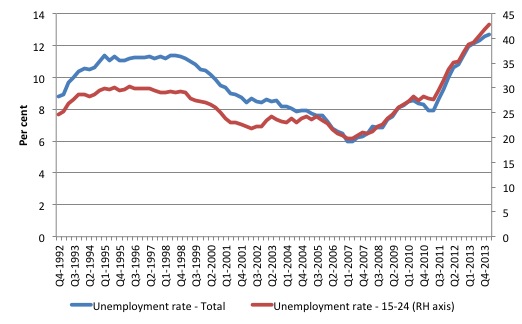
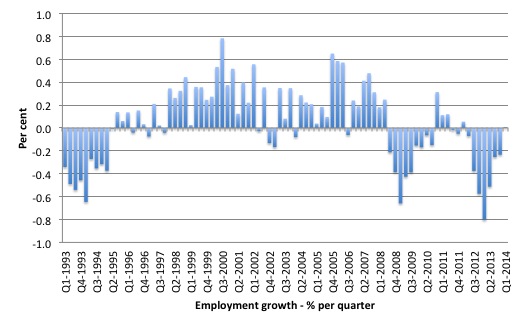
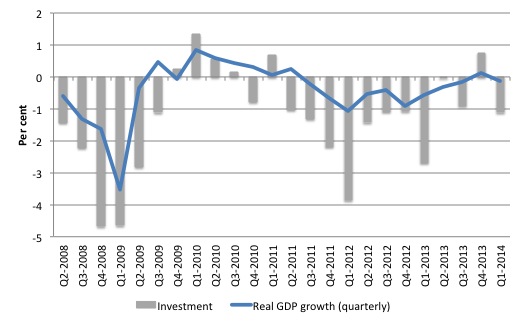
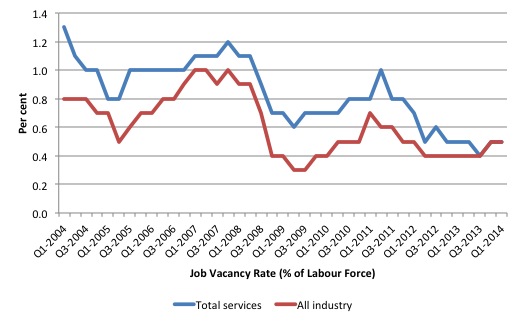
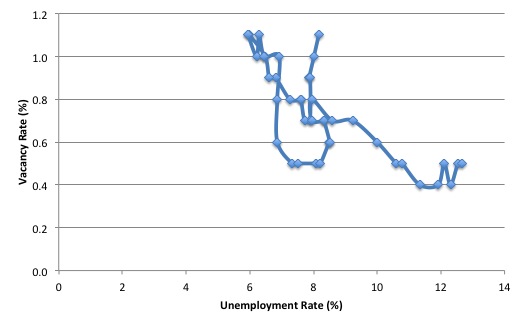
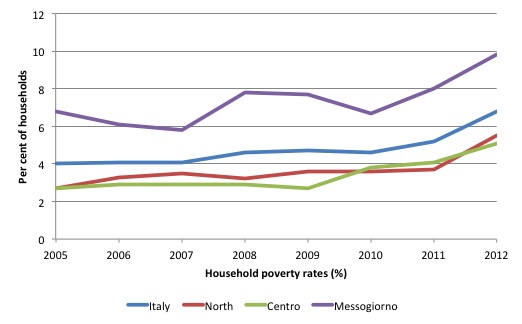
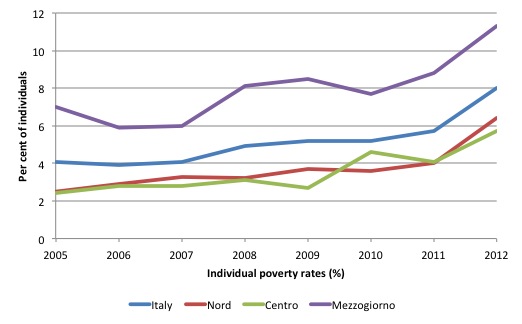
Totally agree – But what would be the costs ?
Dear Bill
I think that a lot of Italians like the euro because it brought inflation down. Most people seem to think that inflation impoverishes everybody because it means rising prices. They of course overlook that for every price there is someone who pays it and someone who receives it. There is also a prestige question. If Italy abandons the euro, many will think that this is proof that Italy wasn’t good enough to belong to this select club, that Italy is an economic failure.
Because the euro is too high for Italy and has been for a while, a lot of Italian firms lost foreign customers, and some may have gone bankrupt. Recovering foreign customers may not be so easy. If the lira is reintroduced, it probably will have a very low exchange rate in its first 2 years, so that Italy will suffer significantly worsening terms of trade for a while.
The only non-marginal politician in Southern Europe who advocates abandoning the euro is Marine Le Pen. This lady has a better understanding of what ails France than the Socialists, who are simply neoliberals light. No wonder she has the winds in her sails.
Regards. James
Dear Bill,
I wouldn’t get my hopes up about Renzi, if I were you. You may have seen this article, which among other things offers the most lucid explanation of recent Italian politics that I have come across. In the article, the author, Perry Anderson, pegs Renzi as the next Tony Blair.
@James Schipper
Your comment about Marine Le Pen is interesting. I would say that the impetus for Italian Euro exit will come, if at all, from the political right rather than the left. There were many (centre) right voters who were never keen on giving up the Lira, and would probably be quite happy to go back to it.
Yes! Marine Le Pen is the ONLY Western politician of any importance who has a clue. Putin also has good inclinations but he’s been thoroughly demonized and Westerners have never been sure about the status of Russia. Russia has experienced rapid growth and no one in the US is aware of it. Rich people do regularly travel to France and a France that re-industrialized would be a beacon of hope for the entire world.
The fate of the entire Western world hinges on Marine Le Pen coming to power and ramming through pro-growth protectionist policies. Pull France out of the WTO, pull it out of the EU and Euro, nationalize the financial sector and watch as France re-industrializes and experiences Asian style 10% growth rates.
Vive la France! Help me Obi-wan-le Pen – you are my only hope!
A good number of people in the PIIGS (Portugual, Italy, Ireland, Greece and Spain) have wanted out of the EURO for a while, yet it seems that whenever a politician such as Renzi, makes the promise to pull them out, nothing happens? Renzi had come to an agreement with Berlusconi, that he would get Italy out of the Euro and restore pensions, etc, etc. But guess what? He becomes P.M. and nothing of the sort happens. Is this just ‘brainwashing’ or something else at work in the European polity? What are your thoughts on this Bill? Because it’s clear what needs to be done, but for some bizarre reason the pollies aren’t moving on this issue. What is at work underneath the politics?
I imagine Italy is much like Ireland is so far as you have a deep masonic framework which prevents distribution of wealth at all costs.
I can’t see it happening.
In this debate the very creepy Donal Donovan preforms for his masters while a left politican is for some inexpicable reason is unable to grasp the dastardly economic frabric that Donovan projects.
https://www.youtube.com/watch?v=uYR2Miu5rCg
Donovan at 4.50 “let me explain what I mean”
“people were receiving social payments which were way higher then the average in Europe”
TD Barrett get close to the truth but never follows its up
“Because the cost of living was far higher”
Good boy.
But why , dear God why.
Because of free / state bank credit creation.
Demons with a creepy smile such as Donovan wish to subtract your real purchasing power by whatever means.
In a Industrial society this means death , poverty destruction .
And yet the conversation remains polite.
Increditable , simply increditable.
Always remember this man and all those other men embedded within the deep state want to kill your mother , your son, your family.
Merely to retain their concetration of wealth.
They apparently have no interest in wealth as a goal by itself.
Anthony Zappia is right: people do want out of the euro in the periphery, they understand perfectly well what is happening economically, yet nothing happens and this conversation is not only marginalised but never, ever takes place. Worse, we endure mind-numbing propaganda and falsification of issues at the European level.
Currently there are two TINAs at play – the economic TINA out of Germany / creditor states and the ever-closer-union TINA from the EU commission, in which the first can only be cured by the second – DESPITE the fact that no EU member state wants closer union. Further theatre is served up in which the Commission & Conseil position themselves as the defenders of Europe (the implication being defenders of the social compact, employment, growth – though this is not directly claimed) whose good intentions are being daily destroyed by the small-minded national politicians of the Eurogroup. The idea being that we Europeans should cast nationalism aside to be saved by ….”ever-closer union”.
Of course this is patent nonsense. The EU is in the grip of two political agendas – yes, maintaining Austerity within Europe is by now 100% political – of which one is the arm of the other.
So the question remains: what on earth are ‘our’ national politicians doing?! It needn’t be Italy that leaves, it could simply be Malta…and the whole EU edifice would start to crack & unravel. In the case of Greece we simply assume they are ‘bought’ since Troika’s policies by now are patently interventionist and for the sole profit of creditor corporations. And 100% against Greek national economic interests. (Overturning our maximum 5-day milk law for one – in a hot country! – to allow for the dumping of end-of-shelf-life UHT 11-day milk from the north – is one example. Insisting that yoghourt can be made with dried milk, another. Both seeking to destroy our dairy industry).